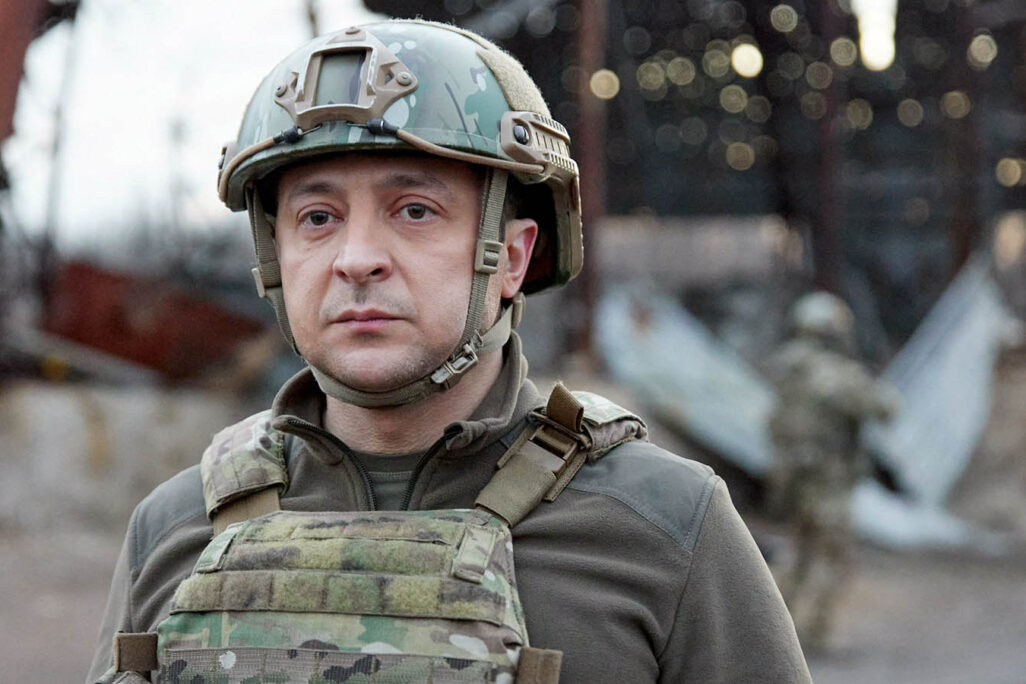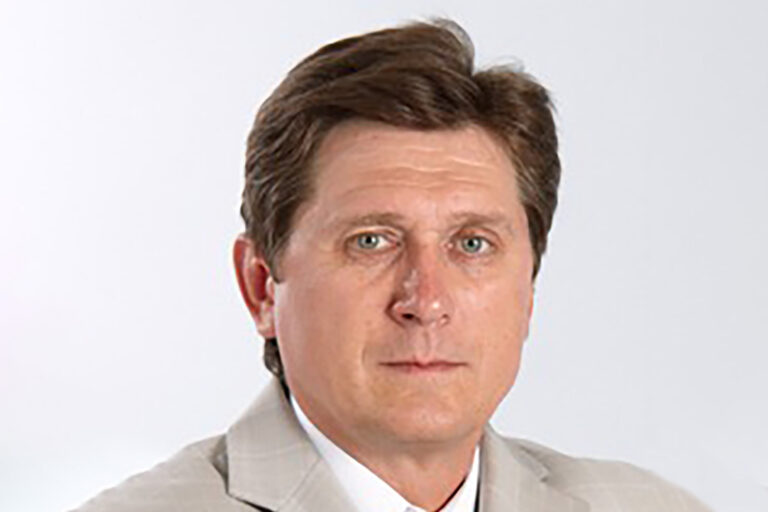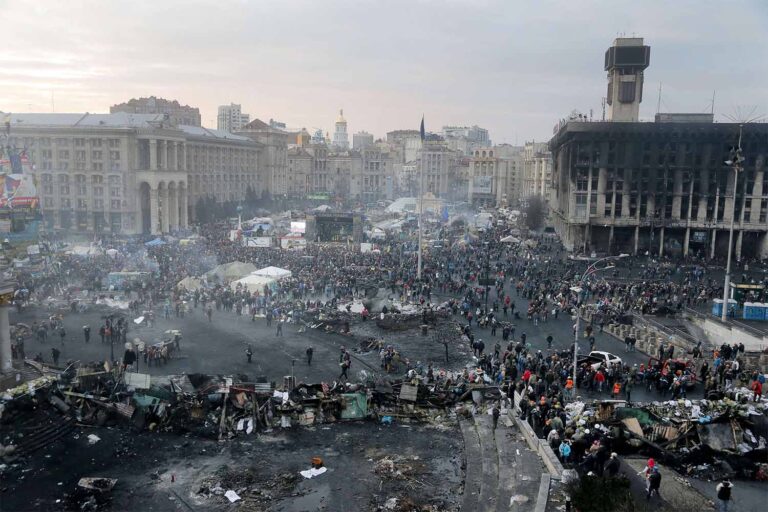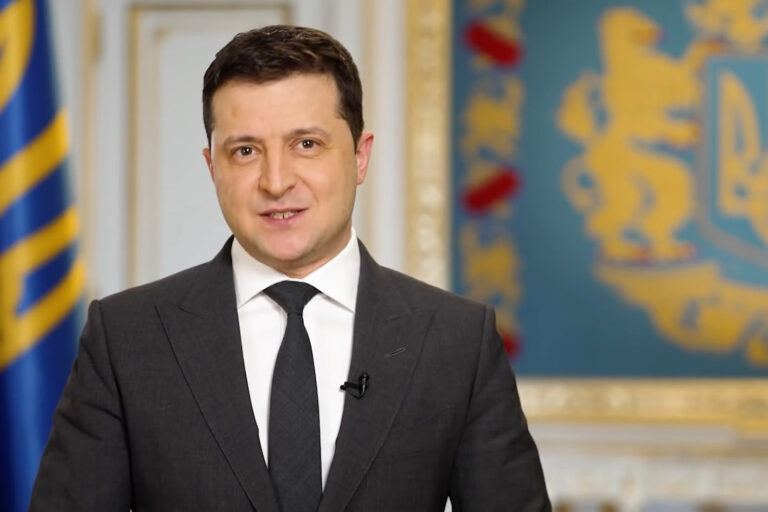
This article was written before the recent invasion and escalation of violence by Russian forces within the last few days.
While the violence between Russia and Ukraine is currently occupying the international spotlight, it is also an issue that defines Ukraine’s internal politics. In a special interview with Davar, Professor Volodymyr Fesenko, head of the Penta Center for Political Studies in Kyiv, explains the political undercurrents within Ukraine, from the Euromaidan revolution in 2014 to the current crisis.
“You can divide Ukrainian politics into two camps,” says Fesenko, who has researched Ukrainian politics for more than two decades. According to Fesenko, the trend of the last decade can be summed up as “the Ukrainian people turning towards the West.”

“Up until Zelensky’s election as president in 2019,” says Fesenko, “you could describe the political map along the following lines: the patriotic camp versus the pro-Russian camp.”
Who makes up the patriotic camp?
“This is a wide population, about a third of the country’s voters. Some of them took part in the conflict in 2014 and actively support the army. In general, this camp is associated with a hawkish approach to the conflict with Russia and calls for a complete rejection of the Minsk agreements, which called for Ukraine to enter into negotiations with Russia on the future of the pro-Russian regions of eastern Ukraine.
“This is a large camp which is not willing to cede a single inch of territory in Donbas [the region of eastern Ukraine which is partially controlled by pro-Russian separatists], and actively calls for the return of the Crimean Peninsula to Ukrainian control. The clear leader of this camp is former President Petro Poroshenko.”
And who is in the pro-Russian camp?
“The pro-Russian camp, also known as the ‘anti-Euromaidan camp’ (the Euromaidan revolution took place in Kyiv in 2014 as a reaction against the government’s decision not to sign agreements with the European Union), sees the current government as responsible for the present tension.
“They don’t necessarily support Putin or identify with Russia, but they’d say that the responsible path would be to establish relations with Russia and move towards reconciliation. Today they make up about 10-15% of voters, but that hasn’t always been the case.
“Until the Euromaidan events, half of the residents of Ukraine expressed trust in Russian President Vladimir Putin. He was the second-most popular leader in the country. More than 60% expressed trust in the president of Belarus, Alexander Lukashenko, who until recently refused to recognize the Russian annexation of Crimea and was well-liked in Ukraine, but now threatens to send Belarussian troops into its borders.”
Ukraine’s Pro-Western Revolution
Immediately after Russia’s annexation of the Crimean Peninsula and the outbreak of armed conflict in 2014, some residents of Donbas and all residents of Crimea, lost the right to vote in Ukrainian elections. This led to the collapse of two political parties: the pro-Russian Party of Regions, led by Viktor Yanukovych (the former President who was ousted in the 2014 Euromaidan protests); and the Communist Party, which had pro-Russian tendencies and was outlawed in 2015 under the accusation that it constituted a “fifth column.”
Together, these two parties received over nine million votes in the 2012 Ukrainian Parliamentary elections. In other words, about 43% of Ukrainian voters supported avowedly pro-Russian leadership.
The remnants of the Party of Regions and the Communist Party reformed into two coalitions: the “Oppositionary Bloc,” and the “Oppositionary Platform.” Together, these two decidedly pro-Russian parties received 2.5 million votes in the 2019 presidential election, 13% of the total. In other words, a drop of 300% from seven years prior.
“The main thing that’s important to understand here is that the balance of powers has shifted,” explains Fesenko. “Today, the pro-Russian parties have no chance of forming a governing coalition. They have no way of taking the reins from the pro-Western parties. This is an undeniable achievement of the protesters who took to the streets in 2014.”

Do Ukrainian citizens want to join NATO?
“The view of NATO has changed drastically. The organization, which is currently portrayed in many parts of Ukraine as the great savior of the nation, had lower than 20% popularity ratings in 2014. Then, 60% of Ukrainians expressed clear opposition to joining NATO because of the potential upheaval that such a move could bring to the region. Today, more than 60% of those who support the pro-European reforms want to be part of NATO.
“It’s important to note that these surveys don’t include residents of Crimea or Russian-controlled areas of Donbas, and so the results are slanted in favor of the West.”
The Comedian who Broke the Mold and Became President
Volodymyr Zelensky, at 44 years of age, is the youngest president in Ukraine’s history, as well as the first Jew to serve in that role. He is a comedian, screenwriter, and owner of a production company. He rose to fame when he played Vasyl Holoborodko, a grumbling history teacher who surprisingly becomes President of Ukraine in the comedy television series Servant of the People.
The show’s pilot episode was broadcast exactly one year after the Russian annexation of Crimea, and it was enormously popular in Ukraine.
In 2018, after three seasons and a movie, Zelensky announced that he was founding a real political party under the name “Servant of the People,” and he was joined by the members of the production team. In May 2019, Zelensky won 73% of second-round ballots in the presidential election, the largest margin of victory in any Ukrainian presidential race.
“Our young nation had never seen anything like this. We had always had two camps: Ukrainian on the one hand, and post-Soviet on the other,” Fesenko explains. “Zelensky managed to break the mold and bridge the gap between the voters in the East who tend to favor Russia, and those in the West who are very patriotic.
“This was partially the result of ongoing public frustration with the old pro-Russian elites, such as Viktor Yanukovych, but also frustration with the pro-Western elites, such as Zelensky’s predecessor Petro Poroshenko. You could say that voting for Zelensky was above all a protest vote.”
What platform did he run on?
“Zelensky takes a centrist stance that doesn’t lean too far to any side. The centerpiece of his platform was waging a war on corruption, something everyone can get behind. In the political arena, his initial tendencies were towards entering into negotiations with the Russians, including the possibility of reaching a compromise in Donbas. The main thing was not to come down clearly on either side. When talks with Moscow failed, he started turning more clearly to the right.
“His turn to the right certainly came in response to the cold shoulder he received from Moscow, but it was also the result of extreme opposition to the negotiations within Ukraine. Zelensky changed his stance, and today Crimea and Donbas are a red line for him. He’s not open to any compromise or dialogue with pro-Russian forces in Donbas.
“Following his turn to the right, Zelensky imposed a series of sanctions against Viktor Medvedchuk, a Ukrainian politician and businessman and a close ally of Putin. He shut down three television stations that were owned by Medvedchuk, among other things.
“Zelensky also began turning to the West with demands to initiate the process of Ukraine’s admission to NATO. This was also the moment when the Russians started to send military forces to our borders. It’s worth noting that up until that point, Zelensky had barely addressed the matter of NATO membership at all.”
How is Zelensky different from his predecessor Poroshenko?
“Ideologically, there’s no fundamental difference between the two. Poroshenko is identified with the old, more aggressive Ukrainian nationalist establishment. Zelensky is more moderate, he’s seen as a young leader from the world of high-tech and television.
Despite this, the relationship between the two is one of pure hatred. There’s a certain paradox here, because as I said the political differences between them are negligible. But there is complete and total hatred between the two camps.”
The More Putin Digs in, the Stronger Zelensky Becomes
The threat of war improved Zelensky’s approval ratings, which had slipped since the beginning of his presidency due to the ongoing economic crisis as a result of the Covid-19 pandemic and high inflation, especially in the energy sector.
Fesenko says that the energy industry plays a central role in internal Ukrainian policy. Poroshenko is currently being tried for treason on accusations that throughout 2015 he purchased coal from the Russian-controlled area of Donbas, which was then and continues to be at war with Ukraine.
How have the current tensions influenced Zelensky’s behavior?
“Zelensky’s supporters, and those without a strong opinion towards him, tend to view him positively regardless of his actions. This makes up somewhere between a third to 40% of voters.
“He declared February 16, which American intelligence had suspected might be the start of the Russian invasion, to be ‘Unification Day.’ Judging by the presence of protesters in the streets, and the media coverage of the matter, this seems to have been a wise decision. In general, recent surveys tend to show support for his stance against Russia, but even more so for his stance against the West, which seems to be trying to force him to make compromises. On the other hand, he made brave alliances with new partners such as Poland, Britain, and Turkey.”

The more Putin digs in on his aggressive stance towards Ukraine, the stronger Zelensky becomes. Surveys from the last few weeks show clear support for Zelensky’s demands. Two thirds of Ukrainians say that they are very familiar with the Minsk agreements, which include the cession of parts of the Donbas region to Russia. 63% demand new agreements that favor Ukraine, a stance that commanded the support of less than 25% of Ukrainian citizens just four years ago.
These changes point to a clear patriotic trend. 20% of those surveyed claimed that if the world tries to force Ukraine to cede Donbas, Ukraine will have to ignore the international community and annex the territories by force.
“Zelensky won’t last a single day as president if he declares, or even hints, that he’s willing to negotiate on the territories in Donbas or Crimea,” says Fesenko. “That just won’t happen, and that’s also the logic behind the fact that in all of his national addresses in the last few weeks he declares firmly that that won’t happen.
“The president knows that if he moves in a direction that the public perceives as warming up to Putin, it could lead to a new Euromaidan. Except for the pro-Russian party, there’s complete unity in both houses of Parliament against any negotiations with Russia, which effectively buries the Minsk agreements.”
What criticism is there of Zelensky?
“The criticism is mainly focused on him not responding to events quickly or forcefully enough. But the bottom line is that most of the public would say that he’s acting reasonably. The latest surveys show him receiving support from a fourth of voters, which is a respectable amount. It should be noted that in the first round of the 2019 election he received 30%.
“He’s not good at giving live speeches, that’s a known weakness of his, but people are excited by his recorded speeches. He is above all a talented artist, and he manages to touch people’s hearts.”
This article was translated from Hebrew by Sam Edelman.






